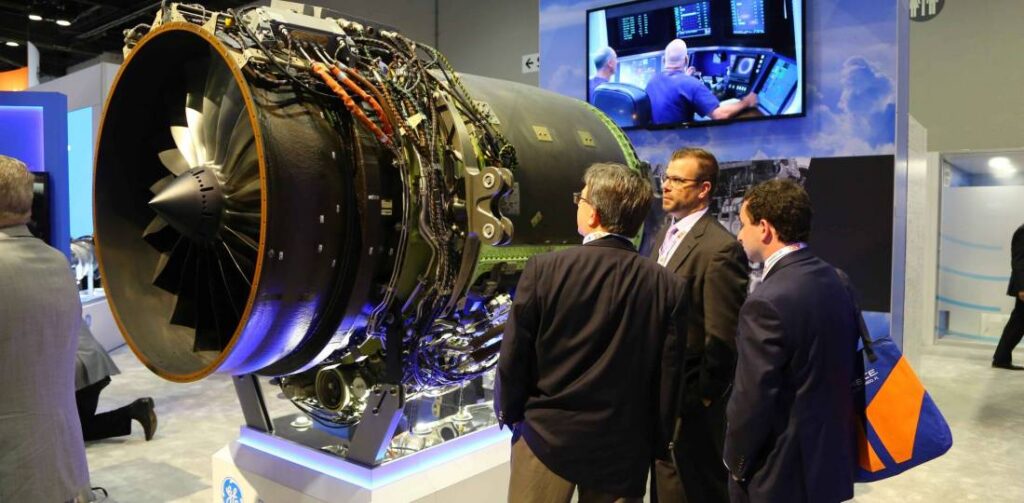
GE Aviation recently completed successful first testing of its Passport long-range business aviation engine, which uses 100 percent renewable aviation fuel (SAF). Ground testing with one engine took place over two weeks in March at GE Aviation’s Peebles Test Operations in southern Ohio.
The SAF used in the tests, HEFA-SPK (hydroprocessed esters and fatty acids synthetic paraffinic kerosene), is the most widely available today and can be made from cooking oil and other waste fats, oils, and greases. Preliminary test results showed that the engine performed similarly to a petroleum-based jet-A engine. At the moment, the SAF approved for use is a 50 percent blend of petroleum-based jet A or jet A-1 fuel and a SAF component.
ASTM International, a technical standards organization, has not yet certified 100 percent SAF. GE Aviation is collaborating with an international task force to standardize industry specifications in support of 100 percent drop-in SAF adoption.
“As our testing has shown, the Passport engine, like all GE engines, can operate today and in the future on approved sustainable aviation fuel.” “Our customers can be confident that the Passport-powered [Bombardier] Global 7500 will help them meet their sustainability goals to reduce CO2 emissions in flight, thanks to the Passport’s more fuel-efficient technologies and ability to operate on lower-carbon fuels,” said Melvyn Heard, GE general manager, Passport engine program. Heard stated that the Passport’s performance on 100% SAF was “no surprise to us,” and that more was done to demonstrate that capability to customers. “We don’t see any limitations on the engine,” he said, referring to the engine’s use of 100 percent SAF.
Since 2007, GE Aviation has been actively involved in assessing and qualifying SAF. SAF can be made from a variety of materials, but when compared to fossil fuels, using alternative feedstocks and processes for SAF reduces CO2 emissions during the production, processing, and distribution phases.
This is the latest in a series of 100% SAF tests conducted by GE and CFM International, a joint venture between GE and Safran Aircraft Engines. Other tests with 100 percent SAF in 2021 included flying with 100 percent SAF in one of two Leap-1B engines on a Boeing 737 Max 8 operated by United Airlines; ground tests and flying with 100 percent SAF in one Leap-1A engine on an Airbus A319neo; and flying with 100 percent SAF in the Boeing ecoDemonstrator.
GE’s Passport engine, which entered service in 2018, consumes 3 percent less fuel than other engines in the 18,000-pound thrust class and 17 percent less fuel than the GE CF34-3 engine. It is equipped with blisk fan blades, a high-efficiency compressor, a rich-burn combustor, a proprietary turbine system, and a high-efficiency mixer.
Heard claims that the engine has 2-3% lower specific fuel consumption than comparable new engines that will hit the market in the coming years, and that it has room for future performance increases. “The engine is primed for growth,” he said. “We still have capability in the engine that we haven’t fully unleashed yet.”
To date, the installed engine fleet on Bombardier Global 7500s has accumulated more than 80,000 flight hours and 30,000 cycles with a dispatch reliability rate of greater than 99 percent. With the removal of more and more Covid restrictions, that figure is expected to rise to 100,000 flight hours by the end of the year. “We’re finally seeing people use the legs of this [Global 7500] as they were designed to do,” Heard said, noting that one operator flew nonstop from Sydney to Detroit in 2019, a distance of 8,255 nautical miles, and that such flights are becoming more common again.
With more than 80,000 flight hours and 30,000 cycles, the installed engine fleet on Bombardier Global 7500s has a dispatch reliability record of more than 99 percent. As further Covid restrictions are relaxed, that number is expected to grow to 100,000 flying hours by the end of the year. “We’re now seeing people use the legs of this [Global 7500] as they were designed to do,” Heard said, adding that one operator flew nonstop from Sydney to Detroit, a distance of 8,255 nautical miles, in 2019, and that such flights are becoming more common again.
The Passport was recently chosen to conduct hydrogen combustion research. CFM and Airbus announced a new hydrogen demonstration program in February 2022, with ground and flight testing scheduled for later this decade. CFM will convert the engine’s combustor, fuel system, and controls to run on hydrogen. Flight tests will be carried out on an Airbus A380 testbed with an extra pylon for the Passport engine.
Heard believes that achieving GE and CFM’s ultimate aim of boosting efficiency by 20% will require a combination of sophisticated engine design, such as the Passport, and alternative fuels such as SAF and hydrogen.
“The Passport engine has been at the heart of all our new development programs,” Heard added, citing open fan, compact core, and hydrogen propulsion as examples.



